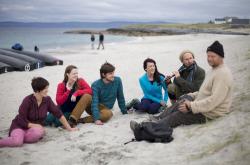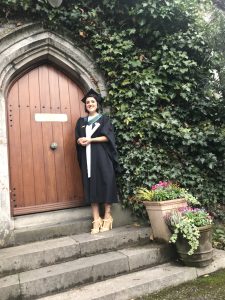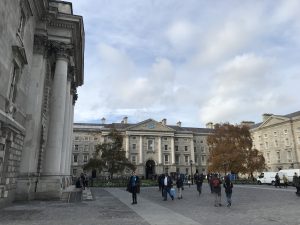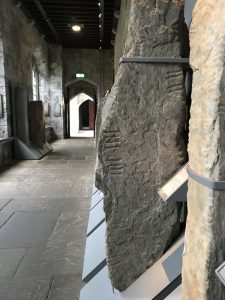Education in Ireland
The land of Saints and Scholars – Education
Ireland has a rich history of education at all levels. Most children attend pre-school from 3-5 years of age and early childhood education is covered by the Early Childhood Care and Education Care program, with funding support from the Government for one year of pre-schooling in the year prior to starting primary school. Free education is available to all students at primary and secondary levels.

Ireland has two languages – English is spoken by all citizens while about 40% of the population can speak Irish/Gaeilge, according to the 2016 Census. Irish is still spoken on a daily basis in the rural Gaeltacht areas of the south and west coast of Ireland. Since the 1970’s there has been a revival of the language due to more availability of education through Irish in urban areas, allowing for education up to the Univesity level through Irish. With the advent of Radio na Gaeltachta in 1971 and Telifís na Gaeltachta (TG4) in 1996 Irish became part of the media offering and in 2015 Irish was made an official language of the European Union. Therefore, when we talk about education we identify the language through which it is taught.

Primary Education
All children in Ireland must attend school from 6 years of age, though most children attend from the ages of 4 or 5, and the system has an 8-year cycle. The Irish Primary Education system is state-funded with teachers paid directly by the Department of Education and Skills and standards are monitored by the Department’s Primary Inspectorate. State-funded primary schools are located in even the smallest communities and special schools and private primary schools are mainly found in urban areas. Schools receive funding support for managing the day-to-day running of the schools. There are Gaelscoileanna (Irish language schools managed by an Foras Patrunachta), religious schools (Catholic, Protestant, etc), multi-denominational schools, and non-denominational schools.
Staffing of primary schools is dependent on the number of pupils in the previous academic year with a pupil-teacher ratio of 1:25 on average. Some schools have funding support for books and there is extra funding for special needs and disadvantaged schools.
Post- Primary Education / Second level Education
There is a wide choice of school types with single-sex or co-education schools, denominational schools managed by boards of management, non-denominational schools and ETB managed schools. Education is normally though English, but in some areas, Gaelscoileanna teach all subjects in Irish. The students have a wide range of choice of subjects with English, Irish, and Maths being core subjects for all year groups. Science, languages, History, Geography, and practical subjects such as Home Economics and Construction Studies are optional subjects. Students sit a State Exam called the Junior Certificate in up to 10 subjects at the end of the 3rd year. After this students take the senior cycle and choose from:
Leaving Certificate,
Leaving Cert Applied,
Leaving Cert Vocational Preparation
Students sit for final exams at the end of the 6th year. Most schools provide an option of a Transition Year before the senior Cycle. Second-level education is supported by the Department of Education and Skills, the State Exams Commission, and Tusla. A state grant per pupil is paid to each school per annum for the management of the school and teachers in all state-funded schools are paid directly by the Department of Education and Skills. The majority of students attend free second-level education in Ireland with more private schools and boarding schools in urban areas. Bus service is provided in rural areas and is free to the nearest public school once the student is more than 3km from the school and within the catchment area.
Third Level Education in Ireland / University Education

Third Level Education in Ireland is provided in a range of Universities and technical colleges. For residents of Ireland or an EU member state, you have to have spent 3 of the last 5 years in this region before starting university to qualify for subsidized university education. For those from outside this region, an overseas student fee is charged. All details on applying to Irish colleges on the Central Applications Office (CAO.ie), along with dates and prices for application. Quality and Qualifications Ireland is the state agency responsible for the quality, integrity, and reputation of Ireland’s further and higher-level education system, ensuring that qualifications are valued nationally and internationally. Education at the 3rd level in Ireland is mostly taught through English.
There are 9 universities in Ireland. The Queen’s Colleges were built during the reign of Queen Victoria in 1845 and these are now part of the National University of Ireland (NUI) in Cork, Galway, Dublin, and another university in Maynooth. They offer a wide range of courses including medicine, veterinary, and dentistry at the undergraduate level and postgraduate to Ph.D. level. Dublin has also got Trinity College and the Royal College of Surgeons in the city center. The Medical Council promotes high standards in medical education and training in Ireland and

provides specialist training. NUI Galway is the center of academic work in Irish and some courses are taught through Irish. The Connemara Gaeltacht is nearby where the spoken language is Irish. There is a 20 year Gaeltacht strategy for development published by the Irish Government in 2020, and the language is a vibrant part of the music and cultural life of Ireland.
Dublin City University (DCU) and the University of Limerick (UL) are newer universities with a wide range of courses. The newest universities are the Technological Universities that offer more practically based Certificates, Diplomas, Degree, and Post-Graduate courses. The Atlantic University is the newest University in Ireland (April 2022) bringing together the Technological Colleges of Sligo, Galway, and Letterkenny. The Technological Colleges of Cork and Tralee have amalgamated to form Munster Technological University and Waterford, Carlow and Dundalk have Institutes of Technology. Teacher training takes place in Mary Immaculate College, Limerick, St Patrick’s Teacher Training College in Dublin, and other colleges attached to universities. Hotel and Catering are taught at the Shannon College of Hotel Management and Art is covered by the National College of Art and Design (NCAD) in Dublin and the Crawford College of Art and Design in Cork.



Leave a Reply
You must be logged in to post a comment.